Peter MALONE
Saturday, 18 September 2021 19:30
Hammers Over the Anvil
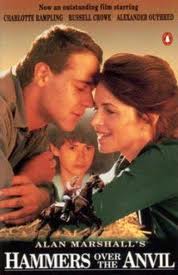
HAMMERS OVER THE ANVIL
Australia, 1992, 102 minutes, Colour.
Charlotte Rampling, Russell Crowe, Alexander Outhred, Frankie J. Holden, Frank Gallacher.
Directed by Ann Turner.
Hammers Over the Anvil is an adaptation of an autobiographical book by novelist Alan Marshall. It is set in the early decades of the 20th century in a country town and re-creates the period well. Films of Marshall's books include his autobiography, I Can Jump Puddles, made by a Czech company in the 1970s. Gillian Armstrong also made a short film of his story One Hundred a Day.
Ann Turner directed the experimental short on religion and sexuality, Flesh on Glass, as well as Turtle Beach and Dallas Doll. The film was one of the earliest of Russell Crowe's Australian films. Alexander Outhred is very good as the young Alan and Frankie J. Holden gives another sturdy performance as his father.
The film focuses on life in the town where Alan Marshall's father is a storekeeper. Alan himself, suffering from a disabling disease, polio, uses crutches to walk and has a great desire to ride a horse. At the end, in order to help his friend East, he mounts a horse but is dragged to the town in order to help. He has to resign himself to being a writer.
The film focuses also on a young man who lives by himself, who is excellent in training horses. The other focus is the Mc Alister couple who have come from England. Grace Mc Alister (Charlotte Rampling) is an older woman who is restless and becomes infatuated with East. The film is from the point of view of Alan Marshall with his voice- over, commentary, observations on characters, and his discovery of sexuality. The film reminds us of The Go- Between where the young boy is made to be complicit in an affair. The film did not get much release at the time of its making, which is a pity as it has a great deal to offer. In hindsight, with the pairing of Russell Crowe and Charlotte Rampling, it would probably get far more attention these days.
1. Alan Marshall? His boyhood, crippled, ambitions to ride, ambitions to write? His later work? His perspective on his childhood?
2. The period settings, the décor, the town, buildings, the farms? The countryside? The musical score?
3. The title, the blacksmith's, the horses, the saying about the horseshoe being between the hammer and the anvil, being able to be shaped in any way? The scenes with Thomas the blacksmith illustrating this?
4. Alan Marshall, his age, experience? His dead mother, his storytelling about her, visiting her grave? His relationship with the rest of his family? With his father, the storekeeper, their bonds, the story-telling? His father angry with him when he found out about East? The clash between the two, each saying they hated each other? His being in hospital and the reconciliation with his father, his father reading his stories? The voice-over and his perspective? His putting East on a pedestal, the opening with East riding naked on the horses, Alan's admiration? The fascination with the Mc Alisters, his kissing Grace Mc Alister's hand? The long discussions with East, the friendship with Grace, the discussions, going to tea? His discovery of the sexual relationship? East losing his temper, Grace swearing him to secrecy? His being used at the dance to get Grace to meet East? People blaming him? His attempts to ride, trying to get on the horse and failing? Practising on the fence? His friendship with Joe, their shared experiences, kissing Lucy? His story and Joe's reading it about the ants in the tea, yet his continued friendship? Alan and his watching East riding, going out and finding him? Getting on the horse, lying on it, being dragged so that East could be treated by the doctor? The old lady, talking with her, the frosty nights, finding her dead? The finale in the hospital, seeing East as a vegetable, Grace taking him away? Settling down to life in the town?
5. The character of East, initially with the horses, naked in the river, riding the horses literally bareback? His way with them? His friendship with Alan, talking with him? Meeting Grace Mc Alister, her request about the horse, bringing him over? The beginning of the relationship, the sensuality? Their reaction to Alan seeing them? East and his growing desperation, dressing for the dance, calling Grace out through Alan? The dance, Mc Alister sending his steward, the fight? His riding desperately in the dark? Alan finding him, falling from his horse, the injuries, in the hospital, becoming a vegetable? Grace taking him to care for him?
6. Grace and her husband, from England, her restlessness? Wealth, fashion? Her husband's age, possessive of her, jealous? The visiting the store, the discussing of the materials and fabrics? Meeting East, the discussions about the horse, the bargaining for the price of the horse, the cup of tea? Alan and his witnessing the haggling? The affair with East? Her swearing Alan to silence? The dance, her trying to protect her husband, her touching East's face, her husband seeing it, the scene? His taking her away? Her coming in the night to take East away, the conversation with Alan about his being like a baby? A restless woman, ambitious, getting older, needing to settle down?
7. The Marshall family, the dead mother, the father and his keeping the store, giving himself to his children, the family scenes, the girls playing the piano? With his customers? At the dance? His fall-out with Alan, the reconciliation?
8. The blacksmith, as a preacher, his work, the competition with the pigs and Joe and Alan losing, Nellie winning, their seeing Nellie go into the barn, prying and seeing the sexual encounter? Her pregnancy, being sent off? Thomas and his threats to the boys? Their escaping him? His finally congratulating them?
9. Joe, family, poor, friends with Alan, sharing everything, playing together, his infatuation with Lucy, his pig not winning the competition? The story about the ants in the tea? Yet his remaining friends with Alan?
10. The old lady, mischief-making, the boys supporting her, hiding, going back for meals? The talk with Alan, her life, the frosty nights, Alan finding her dead?
11. The life of the town, the pig competition, the Catholic dance, shops, horse-training, the train coming, the ostrich sequence and East and Grace riding off to find the ostrich? The religious meetings? Families? The turn of the century and the beginning of a new era?
Published in Movie Reviews
Published in
Movie Reviews
Tagged under
Saturday, 18 September 2021 19:30
High Rolling

HIGH ROLLING
Australia, 1977, 83 minutes, Colour.
Joseph Bottoms, Grigor Taylor, Judy Davis, Wendy Hughes, Sandra Mc Gregor, Gus Mercurio.
Directed by Igor Auzins.
High Rolling was advertised as a "good times" film - but only when the phrase means doing what you like, when you like, without responsibility, moral scruple or concern for anyone except your mate. Attractive production technique and pleasing Sherbet music go towards 82 minutes (was the film planned as one of those inconsequential telemovies?) of wandering the Queensland roads where drugs, sex, booze and easy money are the taken for granted atmosphere and where Surfers' Paradise is the equivalent of the lurid corners of an advertising brochure. Now notable as Judy Davis' first film.
1. For whom was this film made? Age group.. Australian audiences, overseas? Success for the respective audiences?
2. The technical side of the film: location photography, glossy presentation, musical score?
3. The American models of the 'road' film and men wandering up and down the road, various adventures? The fact that Tex was an American? Indication of the American influence on Australia,, Australian entertainment?
4. How authentic the Australian atmosphere? How authentic a portrait of a cross-section of Australians? Queensland? Fairgrounds, people on the road. Surfers' Paradise, the nightclubs, the wanderers, the drug peddlers,, the police. the tourists? Appropriate for this kind of comedy melodrama?
5. The atmosphere of North Queensland and the carnival? Tex and his shooting gallery, Alby and his boxing? The casual promiscuity of the girls? The brutality of the fight and Alby moving away from it?
6. Tex and Alby as friends? The bonds they had in common. the yearning for freedom and independence,. how ordinary and typical of men of their age? Aims in life, wandering. lack of money. ambition? Relating to each other in friendship, attitude towards girls,, sexuality? Their hitchhiking? Their quest in moving south? The significance of the sequence in the church and the discussion about freedom and the ironic and permissive touch they gave it?
7. The highway and the people on it? Picking up the girlfriend? The man peddling the drugs and the room at the motel. the set-up and the fight? Their taking the car and its consequences? The repercussions at the end with the thugs arriving with the driver? The amoral attitudes of Tex and Alby towards drugs, easy money taking the car?
8. The girl and her being picked up by them, their showing off in the car? Her aims in going to the commune,, thinking she would be a prostitute? Genial friendship with the boys? Her arrival at Surfers and going off happily,. giving them the money to pay for the hamburgers etc., the sequence on the beach. sharing the experience with them, her reliability with the car at the end?
9. The presentation of Surfers' Paradise, its gloss. clothes, the beach, nightclubs,, girls singing there,, the bouncers and their brutality? Easy wealth, permissiveness the trading of drugs? Tex and Alby enjoying this, especially with their change of clothes, their behaviour in the nightclub and making friends with the girls? The effect of being thrown out of the nightclub? Alby and his spending all the money?
10. The picture of the girls as singers in the nightclub,, the act and their song, their attitude towards Tex and Alby, drinks, spending,, taking all of his money. taking the drugs?
11. Tex and the repercussions of the bashing? The night on the beach and coming to his senses?
12. Decisions about getting the drugs, the idea of the highway robbery? The preparations with the sheep, the comedy style, the genial kind of robbery. the passengers, the driver and his commentary and reaction, the arrival of the police? The humour and melodrama of the chase?
13. Audience enjoyment of this kind of picaresque story attitudes of humour, observation of life,, values or lack of values?
Published in Movie Reviews
Published in
Movie Reviews
Tagged under
Saturday, 18 September 2021 19:30
High Country
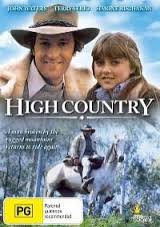
HIGH COUNTRY
Australia, 1983, 90 minutes, Colour.
John Waters, Tom Oliver, Terry Serio, Simone Buchanan, Brett Climo, Caroline Gilmer, Kerry Mack.
Directed by Bill Hughes.
High Country was a big-budget 1983 Australian telemovie. The crew returned to the locations for the filming of the popular The Man From Snowy River. Television and stage actor John Waters was chosen for the leading role. The film is aimed at the wide family audience - and succeeds with the blend of action, sentiment, humour and irony. The mountain country is attractive. By and large, the material is fairly predictable - but often has the dash of toughness that makes it attractive to local audiences.
1. An entertaining telemovie? The style of telemovies 1983? The bush, the mountain scenery, country life? Country people and their lifestyle? Horses? The contrast with city people?
2. The impact of the telemovie for its wide audience? Telemovie style, issues? A star vehicle for John Waters?
3. The popular and familiar story? How predictable? If predictable, does it matter?
4. The use of locations: the towns, the high country, the Mountains, the weather? The special effects - especially for the horses? The musical score?
5. The portrait of the bush men and the contrast with city men? The men in the country, the towns? The cliques and what it needs to become 'local'? Droving, horses, stud farms? The troubles of the high country and the hazards? Money? Injury and deaths? The theme of the father with the motherless daughter?
6. Stacey and the situation with the horse? His plan to run the horse? For it to be lame? His influence in the town? The men working for him? The police? The return of Lomax? The clashes? Lomax taking the horse? The chase? His cruelty and the death of the horse? His being presented as a villain? His assistant turning against him? Defeated?
7. The contrast with Lomax as hero: his work in Queensland, a wanderer, the telegram, his return, his buying the horse-float, his plan, the visit to Debbie and their reunion, friendship with Dave, covering his tracks, the fights in the hotel, leading people astray, his return to the family, the meal? His taking the horse? The escape, Debbie coming with him, her injury and Dave's fault? Their being caught? The death of the horse and his having to shoot it? His emotions? Settling the situation and remaining? The strong bush man? His reputation? His wife, her death and his relentlessness? His trying to restore integrity?
8. Debbie as a strong daughter, her living with the family, school, outdoor life, need for her father, covering up for him dramatically? Going with him and the horse? Her injury?
9. Stacey's helper and h-is former work for Lomax, disillusionment with him, his seeming to be a villain yet his heart in the right place? His comeuppance in the game of pool with Dave? His changing loyalties?
10. The police, ordering bikies out of the town, influence of Stacey, the helicopter rescue?
11. Dave as a wandering bikie, his friendship with Lomax, setting up the game of pool and winning fifty dollars, wanting work from Stacey? The clash, Lomax giving him shelter? The pressure of the police and his having to steal his bike back? His being lost in the mountains? His awkwardness, his help? His being poked fun at with working with the cattle?
12. Country style, the pub, pool games, meals, working with the cattle, droving?
13. The old hands around the town, the loyalty of Lomax's friend guiding Stacey in the wrong direction?
14. The visual and verbal humour, the laconic wit and irony?
15. The film geared for audience expectations? Bush traditions: hard, sentiment, integrity? Especially for city audiences?
Published in Movie Reviews
Published in
Movie Reviews
Tagged under
Saturday, 18 September 2021 19:30
High Commissioner, The

THE HIGH COMMISSIONER
UK, 1968, 101 minutes, Colour.
Rod Taylor, Christopher Plummer, Lili Palmer, Camilla Sparv, Leo Mc Kern.
Directed by Ralph Thomas.
The High Commissioner (Nobody Runs Forever) is based on Jon Cleary's Scobie Malone thriller. Cleary has written a series of thrillers with this detective (writing up till 2001) - and Jack Thompson appeared in the title role of the 1975 film based on the novel Helga's Web. This is a much better film than Scobie Malone. It has the reliability of Rod Taylor and a very strong supporting cast. The Australian flavour appears at the beginning with Leo Mc Kern doing an impersonation of a New South Wales Premier (like 60s Sir Robin Askin). The action is in London and involves international espionage as well as a murder in Australia. The background is somewhat like that of a Hitchcock thriller - territory which Ralph Thomas entered with his Kenneth More 1958 remake of The 39 Steps. In many ways conventional, but quite entertaining.
1. The focus of the title and its British tone? The alternative title for America was Nobody Runs Forever. The appropriateness of this title?
2. The importance of the British and Australian atmospheres? Local Australian colour at the opening, Northern Territory, Sydney? This Australian background with Scobie Malone and London? British locations and the contrast of Australian and English manner?
3. The qualities of the film as a thriller? The murder background. the politics, the role of the High Commissioner, Scobie Malone as detective, international espionage? Did they blend well for interest and excitement?
4. How did the film continually focus on Sir James and Scobie? The comparison of the two men and the contrast? Personality, work, idealism and dedication?
5. The presentation of Sir James as High Commissioner? The quality of his work, his status in England? His relationship with his wife and the explanation of the background? His diplomacy, suave manner, courtesy? His manner at the party after Scobie's arrival? How did this contrast with the background of his being accused of murder? The attempts on his life and his reaction? His ability to cope?
6. The assassination attempt. his manner at the meeting, the importance of the conference? Scobie's presence in the background, the quality of the bond between the two men?
7. Scobie Malone as the hero? An Australian detective and policeman? The tradition of the American private eye and the police film? Seeing him at work in the Northern Territory, the toughness and the punching? His arrival in Sydney? The encounter with the Premier and the Police Commissioner? The ironies of his arrival in England and the atmosphere of someone from the Colonies? His Australian appearance and style? His helping the High Commissioner and trying to do his job? Coping with Elsa, Sir James' wife? Joseph and the humour of the British valet? The encounter with the spy? His skill in helping, detecting? Encounters with the British police? The usual ingredients of a thriller?
8. The importance of the Australian background, the Australian Premier and his bluntness and his ambitions? The issues and his tone?
9. The control from Australia of its High Commissioner? The phone calls to and from Australia?
10. The background of international politics and arms? Jamaica and the C.I.A.? The assassins? How well portrayed was the build-up at Wimbledon - Australian tennis-playing, international espionage and assassinations? The chases? The final explosions?
11. The irony of Joseph and his love of money and involvement in espionage? His boss and her cool control of situations?
12. The character of Sheila and her part in the death of Sir James' first wife? Her apprehension, trying to get Scobie on side? Devotion to her husband and concern for him? Elsa as the Australian migrant, her devotion to Sir James, her growing admiration for Scobie? The contrast of these women with the fashionable woman involved in espionage?
13. The portrayal of the British police and their abilities and incapability?
14. The build-up to tension with the meeting itself and Sir James in a breakthrough, the time factor? Joseph and his decisions and his death? Sheila and the taking of the clock to kill herself and the woman? The pathos of these deaths?
15. How well did the film blend personal and social thews with the thriller genre?
Published in Movie Reviews
Published in
Movie Reviews
Tagged under
Saturday, 18 September 2021 19:30
Harvest of Hate
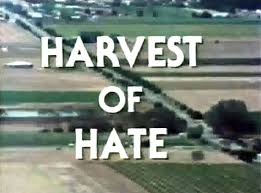
HARVEST OF HATE
Australia, 1985, 75 minutes, Colour.
Kris Mc Quade, Dennis Grosvenor, Leon Cosak, Michael Aitkens.
Directed by Michael Thornhill.
Harvest of Hate is a telemovie made by the prestigious South Australian Film Corporation. The author and director is former critic Michael Thornhill who made impact with his features Between Wars and The F.J. Holden. He had a commercial and artistic failure with the Jack Thompson vehicle The Journalist. This film seems far-
fetched - Arab terrorists training and operating in South Australia. However, given this premise and the melodramatic style, the film moves with some pace even if implausibility. The point being made is interesting enough and there are comments on Australia's sense of isolation from the international community. The opening Israeli
- Arab clash is well done. The rest of the film does not quite measure up to this. A curiosity item and an illustration of Australian telemovie-making.
1. The impact of the film on a television home audience, the qualities of the film in terms of content and style, the local example of film-making from South Australia?
2. The opening sequences and the harvest - and the significance of the title, the Israelis and the experience of terrorism? The hatred in successive generations? The harvesting of hatred in another hemisphere at another time?
3. The impact of the prologue and the focus on Jerusalem, Israel in 1947, the role of the Israelis, the Arabs? Terrorism and its effect? The small boy seeing his father killed? The irony of his identity afterwards - whom did audiences think the son was in South Australia with the sudden cut to Peter?
4. The transition to South Australia in the '70s - another world, atmosphere? The remoteness from Israel and its problems? The background of wealth, work, vineyards? The hero and heroine as types? Affluence, style? The emphasis on Australian easygoing attitudes? Their characters, hopes, work, ambitions, skill?
5. The background of the vineyard business - the owner, his work for the British, his status, presence in South Australia? His bitter memories, politics, morals? His plans, the setting up of the central characters as bait? The final confrontation and violence? His death?
6. The couple going to the house - the prospect of valuing it, the innocent going into the trap, the discovery of the clues? The being trapped? The Arab types and their behaviour - violent, sympathetic? The couple becoming prisoners, their trying to cope, retort, being pushed around? The clashes between the two of them? The hopes for escape and the attempts? The smooth talking of the Israeli guards?
7. The focus on the training, the equipment? The plausibility of Arabs training in Australia? The screenplay and its comments on Australian remoteness from international strife?
8. David and his reactions, his harshness? The emergence of his true identity? The irony of the prologue in relation to him? His helping them escape, the various dangers, chase, clashes, shooting? How plausible a character, his commitment to the Israeli cause, the infiltrating of the Arabs? His death?
9. The effect of the action sequences - pursuit, military manoeuvres, the final trap?
10. The clashes at the end, the confrontations in the cellars? The bringing of the episode to a satisfactory conclusion? The victory of right over wrong? The pro-Israeli stances?
11. How plausible within the space of a telemovie to develop characters' international issues - especially for the Australian audience? Audience judgment on Middle East crises, on the rights of the Israelis, the Arabs, of terrorist activity? How well did this telemovie bring these issues to the home audience as part of their entertainment programme?
Published in Movie Reviews
Published in
Movie Reviews
Tagged under
Saturday, 18 September 2021 19:30
High Noon / 2000
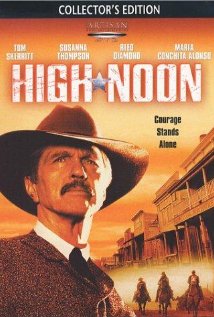
HIGH NOON
US, 2000, 90 minutes, Colour.
Tom Skerritt, Susanna Thompson, Reed Diamond, Maria Conchita Alonzo, Michael Madson, Dennis Weaver.
Directed by Rod Hardy.
High Noon is a telemovie remake of the 1952 classic with Gary Cooper, Grace Kelly, Lloyd Bridges, Katy Jurado and directed by Fred Zinnemann who won an Oscar for his direction, as did Gary Cooper for his performance. The famous song by Dimitri Tiomkin, sung by Frankie Laine, also won an Oscar. One might say that all these ingredients are sadly missing from this remake. It is an act of bravado to remake a classic, especially adapting it for the small television screen. What remains is the basic outline of the plot and the development of the characters according to the talents of the cast. Tom Skerritt, so reliable in many films, gives a persuasive performance as Will Caine. Maria Conchita Alonzo is in the Katy Jurado role and performs well also. Susanna Thompson seems a look-alike to Grace Kelly, if a little older. Dennis Weaver has a guest role and Michael Madsen is, as always, persuasively brutal as the villain.
The film has virtually the same plot, is based on the original screenplay by Carl Foreman, adapted by T.S. Cook, who wrote a number of telemovies. Material from a story called The Tin Star by John Cunningham has also been incorporated.
Basically it is the sheriff, who has done wonders for the town, being abandoned in his hour of need when the criminal he sent to jail has been pardoned and is on the noon train, coming to kill him. The townspeople find every reason possible for not helping, presuming that their sheriff, who's to depart with his bride of the morning, will die. The film plot still works rather well, though in television and telemovie terms it becomes rather more ordinary than the black and white starkness of the original.
1. The popularity of the original High Noon? Its Oscars? Its classic reputation? Its portrait of a sheriff under pressure, not being supported by his townspeople despite his pleas and after all that he had done for them? The importance of his relationship with his wife, her Quaker beliefs in non-violence, her coming back to support him, her shooting the villain? The incorporation of these ingredients into this remake?
2. The quality of the remake: for the television screen, the use of colour, the attractive western town with the mountains in the background, the interiors of the church, the hotel, the offices? The muddy streets? The musical score unobtrusive?
3. The basic plot, the sheriff, facing his enemies at high noon? The law, bravery, self-interest? Love?
4. Will Caine as the sheriff, all that he had achieved? His wedding day? His giving up his star and his gun for the love of Amy? Leaving the town? The news about Frank Miller coming, his decision to turn back, his sense of duty, obligation to the people? His expectation of support and a posse? The altercation with Harve about his promotion, Harve walking out on him? His going to see Helen Ramirez and being prepared to protect her, her decision to leave? Amy coming back from the station, assuming that he had changed his mind and he that she had changed hers? His going to the businessmen in the church, their arguments and turning him down? Going to the mayor and his hiding and sending his wife to the door? The young boy who wanted to help? His being alone? The contrast with the hotel clerk who was looking forward to the showdown and resented the loss of business when Will Caine had cleaned up the town? Caine and his preparations, facing the enemies, his skill in the shootouts, being wounded, giving up because of Amy, taking advantage of her movements, killing Frank Miller? The people coming out, his looking at them, throwing his star and gun in the mud? A man of integrity?
5. Amy, the Quaker background, the memory of the death of her father and brothers? Leaving, at the station, the hotel, the resentment of the clerk, her going to discuss the relationship with Helen Ramirez? Helen rebuking her for leaving her husband? Her fears, going to the train, hearing the shots, returning, taken hostage, her movement and her shooting Frank Miller?
6. Helen Ramirez, businesswoman, relationship with Will Caine, the breaking of it, her relationship with Harve? Memories of Frank Miller? Her skill in business, moving out of town, arranging everything with the businessmen? Her speaking bluntly to Amy? The break with Harve? Going to the station and riding away?
7. Harve, ambitious, young, callow, giving up?
8. The gang, their arrival in the town, nobody able to touch them, going to the bar, the people drinking for Frank Miller? Their turning down any help for Will Caine?
9. The business people and their plans, the armaments, the development of the town? Will Caine going to the church, the minister losing his temper, allowing him to speak? The businessmen asking the pertinent questions, the young volunteers, everybody turning him down? The mayor and his sending his wife to the door, hiding? Her blessing Will Caine? The two old ladies in the church being grateful to Caine for making the town safe?
10. The situation with Caine not being the sheriff, the new one coming in the coming days, his decision to be a man of integrity and help the town? The relevance of this kind of moralising western at the beginning of the 21st century?
Published in Movie Reviews
Published in
Movie Reviews
Tagged under
Saturday, 18 September 2021 19:30
Heaven
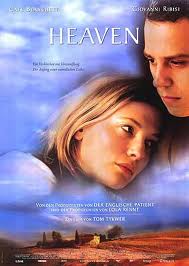
HEAVEN
Germany, 2002, 98 minutes, Colour.
Cate Blanchett, Giovanni Ribisi, Stefania Rocca.
Directed by Tom Tykwer.
One of the main questions many audiences will have on leaving this film will be why it is actually called Heaven. There are plenty of symbolic hints in the second half but the question is whether the symbolism is too strong for the slightness of the plot and the final drama. The first part is more interesting as Cate Blanchett, as a desperate teacher who resents the drug barons of Turin destroying her students, plants a bomb to kill the industrial chief who is in league with the carabinieri for the drug trade. He is not killed. Four innocent victims die. In the main, the early part of the film shows her interrogation, the sympathy of a cherubic looking young policeman acting as translator who falls in love with her and assists in her escape. However, she is willing to accept justice for what she has done.
With the escape, symbolically presented in a train emerging into Tuscan sunlight from a long, dark tunnel, the film throws the couple (who shave their heads and look like twins - and whose names are Philippa and Filippo) into dependence, love and a helicopter escape that looks like an ascension into heaven.
Since the screenplay is by the late Krisztof Kieslowski and his writing associate, Krisztof Pieciewicz, and intended as the first part of an eschatological trilogy, Heaven, Hell and Purgatory, we might expect a film to compare with the Three Colours films. But it is too slight. Since it is directed by Tom Tykwer (Run, Lola, Run) we might have expected it to be more gritty, but the film looks often very genteel and beautiful. Whatever the enthusiasms for and against, there will be a lot of arguments about it in the name of Kieslowski.
1. The work of Kieslowski and his moral fables, questioning parables? The quality of the screenplay, in relation to his other films? The screenplay interpreted by Tom Tykwer?
2. The title, its aspirations, ironies? No heaven on earth? Aspiring to heaven or not?
3. The Italian locations, Turin, the police precincts, the streets and homes, the attics? The Italian countryside and its beauty, the village and the wedding? The house and the hills? The musical score, dramatic, the piano notes?
4. The audience and the emotional effect of watching Philippa and her planting the bomb, the build-up to its explosion, the father with his two children, the cleaner, the lawyer? The deaths? The revelation of the story, her motivation for doing it? The interrogations, the police corruption? Filippo and his helping her? The moral issues, morality and emotion? Law and justice?
5. The opening with the helicopter, the simulator, going high - and the question, "How high can you go?" The finale with the helicopter? Its rising above the earth, the police shooting at it, its going higher and higher, an ascension, disappearing into the clouds?
6. Philippa and her preparation of the bomb, her going to the building, putting it in the basket, hoping to kill the executive? The ironies of the cleaner coming, taking the bomb away, having it in her bucket? The phone call to the secretary to save her life because of the car horn? Philippa waiting, ringing the police, their not doing anything? The disaster of the explosion and the deaths, the little girl lingering?
7. Philippa and the arrest, the treatment by the Italian police? The interrogation, the interrogator and his viciousness towards her? The main questioner and her demanding to speak in English, as her right? Filippo offering to be translator?
8. The development of the interrogation, her explanation of herself, her marriage, the divorce proceedings, her husband's overdoes and his death? His friendship with Vendice, companions in their schooling? The drug deals, Vendice building up an empire? Philippa and her stories of children and the ruining of their lives, the girl hanging? Her own students in rehab? Her letters to the police, the phone calls and their being ignored? Her finding the bomb with her husband's things, her deciding then to kill Vendice?
9. Her being distraught at discovering the truth that he was alive and that she had caused four innocent people to die, her collapse?
10. Filippo and his translation, his infatuation with her, going home, talking with his brother about her being a teacher at school, his wetting the bed, washing, telling his father that he was in love? His decision to help her?
11. The tape recording, the means of helping her, her agreement? The police playing the tapes and knowing the plot, intending to kill them? The complicity of the police, the major and his being in league with Vendice?
12. The elaborate plot, Filippo getting his brother to help, dressing like Philippa, misleading the police? Her escape, the toilet, the phone call, going to the attic? The shower - and the cleaner's having discovered the body?
13. Her reason for escaping, wanting to kill Vendice, Filippo with the gun, the phone call, Vendice's coming, the confrontation and his death? Philippa saying that in justice she wanted to atone for the killings?
14. The escape, going in the milk truck, the driver and the girl and their sexual encounter, escaping at the train station, the trip, the countryside, shaving their heads, eating the ice-cream in the square, the wedding? Philippa's friend and her slapping her and then embracing her, offering to help?
15. Their going to the house, their being received, hiding, eating the meal? The night passing (and their lying together as they did in the attic)? Their going out into the hills, naked, the camera withdrawing? The culmination of their love?
16. The next morning, the police arriving, taking the dwellers in the house? Philippa and Filippo going to the helicopter, taking it, rising - to death, to life?
17. The portrait of Philippa, understanding her, her motivations, her sense of justice, her disgust at the drug industry and the deaths? The shared birthday, her memories of her First Communion? The importance of her saying she had ceased to believe? What does one do after ceasing to believe? Where is right, where is justice? Filippo as young, able to believe in her and his love for her? His explanations to his father, the father coming to help, giving the money? Their going away together?
18. A contemporary moral parable?
Published in Movie Reviews
Published in
Movie Reviews
Tagged under
Saturday, 18 September 2021 19:30
Hackers
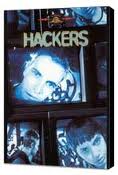
HACKERS
US, 1995, 105 minutes, Colour.
Jonny Lee Miller, Angelina Jolie, Jessie Bradford, Matthew Lillard, Fisher Stevens, Lorraine Bracco, Wendell Pierce.
Directed by Iain Softley.
Hackers is a story, obviously, about teenage hackers, their entering into the computer networks of the business and government world as well as computer fraud. British Jonny Lee Miller is the star hacker, an expert from the time that he was ten and was forbidden by a judge to go near a computer until age eighteen. At age eighteen, moving to New York with his mother (Alberta Watson), he finds himself caught up in rivalry of the other New York hackers. He meets the rebellious Kate (Angelina Jolie), as well as the oddball Cereal Killer (Matthew Lillard, in a kind of performance that he was to repeat in many films including She's All That as well as Scooby Doo). Fisher Stevens is the evil genius engineering the computer fraud for his boss, played by Lorraine Bracco.
The film is of interest mainly for those interested in computers, the Internet, hacking and its skills and consequences. Iain Softley directed the interesting film about the fifth Beatle, Backbeat, as well as an adaptation of Henry James' Wings of the Dove.
1. Audience interest in the Internet, the information highway, hacking and its skills and consequences?
2. The youth focus of the film, the cast, their rivalries, skills and competitiveness, collaboration?
3. The credibility of the plot, the skills of the hackers, their abilities to work with one another, the discovery of the computer fraud, the international links in order to confront it, their winning out?
4. The background of New York City, big business, the companies, the police precincts, homes and apartments, clubs?
5. The prologue and Dade and his skills at such a young age, his being arrested, the court case, the judge forbidding him to go near computers? His relationship with his mother?
6. The move to New York City, Dade and his mother, Dade and his going back to the computers, his skills, connections?
7. Kate and her antagonism towards Dade, her attitudes, the rivalry?
8. The introduction to the group, Cereal Killer and the others, their types, personalities? Their rivalries? Joey as the youngest, his hacking into the company, the banks, his being detected, arrested, going to jail?
9. The police, the exasperation, trying to track down the hackers, arresting Joey, the interrogations? Having tabs on the other members of the group?
10. Eugene and his ingenuity, using the cover of big business for computer fraud, his boss and her not wanting to know, the board meetings? The plot, the computer alteration of the ships and their capsizing, the insurance, the genius behind the programming and execution of these programs?
11. The police and Dade, the approach to him to uncover the fraud, their threats?
12. The group working together, socially, going to the clubs, getting the contacts, the international links and the phone-ups? The types of computer hackers from all over the world?
13. The use of the digital effects for the computers, the information highway, the technology and the machines, the programs, the games, the fraud? All this communicated visually? The race against time, the ingenuity of the various members, of Kate, of Cereal, of Dade, ultimately winning?
14. Eugene and his escape, his being arrested on the plane?
15. The romantic background to the story, the pool and Dade getting wet, the final scene on the rooftop in the pool, with Angelina Jolie and Jonny Lee Miller at this stage of their lives actually marrying in real life for a short time?
Published in Movie Reviews
Published in
Movie Reviews
Tagged under
Saturday, 18 September 2021 19:30
Hellfire Club, The
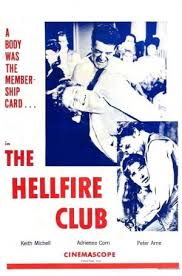
THE HELLFIRE CLUB
UK, 1961, 93 minutes, Colour.
Keith Michell, Adrienne Corri, Peter Cushing, Peter Arne, Miles Malleson.
Directed by Robert S. Baker.
The Hellfire Club is a rather odd historical melodrama, set in the second half of the 18th century in England. It is the reign of George II. Various aristocracy, corrupt with sexual and depraved licence in The Hellfire Club, have control of the Parliament. William Pitt stands against them.
Keith Michell portrays Jason, the disinherited heir to an earldom. Peter Arne is his evil cousin who has claimed the title.
Most of the film consists of chases and fights, especially swordfights. There is the expected romance and betrayal. Keith Michell shows an acrobatic verve in his early career. Otherwise, the film is a postscript to British 18th century history.
1. An entertainment? History, melodrama?
2. The title and expectations, the behaviour of the aristocracy at the opening of the film, other glimpses of their orgies (early 1960s style)?
3. The historical background, George II, the colonies, the aristocracy taking power, William Pitt and his stances? Political intrigue, the thwarting of revolution?
4. The opening, the two boys going to the club, their being discovered, Jason punished by his father, his mother's reaction, their escaping in the coach with Timothy, the coach overturned, the father declaring them dead? The contrast with Tom, his reporting the incident and his being praised?
5. Jason growing up in Holland, with the carnival, Timothy, Yvonne and his friendship, the happy atmosphere? Information about his father's death? His decision to return to England, claim the title?
6. Going to a lawyer, the lawyer's hesitance, then support? Their being overheard? The information going to Tom? Jason's return to his home, saving Isabel from the prowlers(??)? Being brought by Tom into the house, set-up of the fight and the bets? His getting a job? His plan to find the document of his inheritance?
7. Going riding with Isobel, their secrets, her turning against him? His later telling her the truth? Her falling in love with him, yet wanting the power and wealth of Tom?
8. The arrest at the lawyer's, Jason in prison, the escape? The lawyer keeping him safe, the interview with Pitt? Going back to the house, the behaviour of the aristocracy? The confrontation with Tom, the swordfight, his shooting Isabel?
9. The happy ending, rescuing Yvonne, Timothy dead by Tom's hand, the carnival people helping confront the nobles? Happy ever after?
Published in Movie Reviews
Published in
Movie Reviews
Tagged under
Saturday, 18 September 2021 19:30
Hard Ball
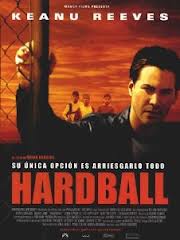
HARD BALL
US, 2001, 106 minutes, Colour.
Keanu Reeves, Diane Lane, John Hawkes, D.B.Sweeney, Mike Mc Glone.
Directed by Brian Robbins.
Now it's Keanu Reeves' turn to step into the line of reluctant movie coaches who have been forced to take on a team of awkward kids who can't pitch or hit a baseball for love or money and turn them into champions while being redeemed in the meantime. From Bad News Bears to Mighty Ducks, we now have the Kekambas on a housing estate in Chicago where chronic gambler Reeves (pursued by bone-breaking bookies) is forced to coach them for a local baseball competition. These Kekambas are tough cookies (and sound it) and live in dangerous apartment blocks where you have your meals on the floor to avoid stray bullets - which, of course, one of the most lovable Kekambas does not avoid.
While we know the outcome, it is watching how it happens that counts. Reeves tries to be agreeable and often is. Diane Lane is the local teacher. There is a lot of baseball, a lot of gambling, and everything turns out OK at the end.
1. The popularity of baseball coaching films, the long Hollywood tradition? The reluctant coach, the team that seems hopeless, the coach being redeemed, the team learning to win and work with each other? This film as a 21st century variation on the theme?
2. The Chicago locations, the betting shops, the offices, the schools, the Projects, the playing fields, the suburbs? Authentic? The musical score and the range of songs - as background to the team and the area of the city?
3. The title, the focus on baseball, its American popularity, the rest of the world? The baseball sequences? Losing, Miles and his pitching, winning? Boys' baseball and its preparation for adult baseball?
4. Conor O'Neill and his being in church, praying? Addicted to betting, his going to the bookies, their threatening him, his running away? Phoning in his bets? Continually losing? His friendship with Ticky Tobin and his making connections with the bookies? The later bookies, his code number, phoning in the bets, risking the money? Winning - and then going off the betting? How well did the film show betting addiction?
5. Conor and his living alone, his not depending on anyone, his chip on the shoulder? Friendship with Ticky? Going to his friend Jimmy for money?
6. Jimmy offering Conor the job, coaching, $500 a week? The pro-bono work by executives in coaching the kids from the Projects? Jimmy being away?
7. Conor and his meeting the kids, the tension between them, the Kekambas and their place in the league? The reaction to Conor? Getting to know them, their different personalities? Age, experience? The tough Project, Conor visiting the homes - and people having their meal on the floor to avoid the stray bullets?
8. The presentation of the kids and their different personalities, Miles and his capacity for pitching, his needing to be listening to his headset, banned, according to the rules, from listening? The boys whose mothers forbade them to play, their being reinstated, the promise that they would do their schoolwork? Baby G and his being a negotiator, his being the wise commentator on the situations? Doing deals about his brother Kofi and negotiating with Conor? His playing, his contribution to the game - the sadness of his being shot by the bullet?
9. The matches, the coaches and the head of the league, their looking down on Conor and the Kekambas, their invoking strict rules? Conor's reaction? Their jealousy of Miles and his skills?
10. Conor meeting Elizabeth Wilkes, going to the school, her lessons, his having to read the book, the discussions in the classroom about reading? His visiting the parents, his promising to coach the children in their reading? Her knowing the truth about him? Inviting her out, the gambling, her leaving? Her later giving him the job, his succeeding as physical education instructor?
11. The ups and downs of the team, Connor and his own personal worries, reaction to Elizabeth, to Jimmy, to the boys? His paying off his debts? His speaking at Baby G's funeral, his inspiring the boys with the spirit of winning?
12. The Kekambas and their wanting Conor to continue with them, to play, the championship, their victory? The fulfilment of the American Dream?
Published in Movie Reviews
Published in
Movie Reviews
Tagged under